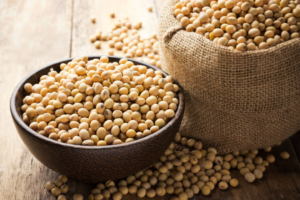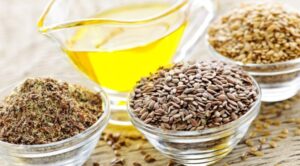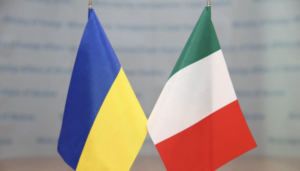
Ukraine is expected to increase soybean production in 2024.
“Ukroliaprom” estimates the soybean harvest in the season-2024 at 6.1 million tons, which is 28% more than a year earlier. The association attributes such growth to a significant increase in production areas – by 46.6% to 2.66m hectares.

In 2024, Ukraine produced 21.7 mln tons of seeds of main oilseeds, which is 94% down compared to the previous year, according to the industry association Ukroliyaprom.
The current season sunflower production is estimated at 12 mln tonnes against 13.9 mln tonnes in 2023/24 marketing year (MY, July-2023-June 2024), which is down 14%.
The oilseed yield preliminarily decreased by 7.8% to 22.6 c/ha, the harvested area – by 5.4% to 5.3 mln ha.
As for rapeseed, Ukroliyaprom estimates its harvest at 3.6 million tons, down from 4.4 million tons in the previous season. The crop was harvested from almost 1.26 million hectares (-11.2%) with a yield of 28.4 c/ha (-2.7%).
At the same time, the association draws attention to the fact that the official information on the harvest of grains and oilseeds in Ukraine in terms of possible production of sunflower seeds has discrepancies with the estimates of various market experts, which is almost traditional for the market. Thus, with the area of 5.004 mln ha and the yield of 21 c/ha, the official sunflower seed production will reach 10.5-11.0 mln tons, which is significantly different from a number of expert estimates.
“Such discrepancies are repeated almost every year. According to the results of the marketing year, based on actual exports of oil, in particular sunflower oil, we can confirm much higher than official production of oilseeds (most of all, sunflower),” summarized Ukroliyaprom.

The Ukraine Recovery Conference will be held in Italy in July 2025.
This follows from the conclusions of the European Council meeting on Ukraine, published in Brussels on Thursday.
“The European Union remains committed to supporting Ukraine’s repair, recovery and reconstruction, in coordination with international partners. The Ukraine Recovery Conference hosted by Italy in July 2025 will be important in that context. The European Union will continue to work closely with Ukraine and support its reform efforts on its European path,” reads the document.

At a press conference, Belgrade Mayor Aleksandar Šapić announced a new package of social measures of the city administration, which includes public transportation.
Šapić initially boasted about cheaper public transportation and the large investments in public transportation that were made during his administration.
He added that no one before him wanted to deal with this problem.
After that, Šapić announced that from January 1, 2025, all public transportation in Belgrade will be completely free.
“No one will have to pay for travel anymore, there will be no monthly or annual passes, no discounts.” “Thanks to this social measure, Belgrade will become the only city in Europe with a population of more than half a million people where public transport will be free,” he emphasized.
He added that this measure complements the package of social measures that we have already adopted, including free kindergartens for all children in Belgrade.
“Since we introduced the measure of subsidizing private kindergartens in the amount of 33,000 dinars, 3,000 more children have enrolled in kindergartens,” Šapić said.
He reminded that it takes about 60-80 million dollars a year.
As a third measure, he also recalled the need to provide students with family assistance.
“Last year we introduced brand new textbooks to all classes,” he said.
He also recalled measures to provide free access to all city swimming pools, as well as New Year’s gift certificates to all preschool and school children and employees of educational institutions.
He also added free English for preschoolers, noting that it is late, but it is expected to be available by the New Year, and that there will be double trimesters in the second semester.
“No city of Belgrade’s size has such a set of activities,” he said. “That’s why we are the most socially responsible city administration that has run the city in the last 50 years,” emphasized Šapić.
As he added, everyone says that it is not free, because it is financed from the budget.
“It’s not free, but you don’t have to pay twice anymore. Because, according to this logic, citizens paid taxes once and then paid it all a second time. “It depends on who runs the city administration,” the mayor said.
In addition to free transportation, Shapych also announced a public transportation reform.
He emphasized that the biggest public transportation reform since at least the Second World War is underway.
“In the next three years, we will completely renew the entire fleet, which includes all buses, all trams, and all trolleybuses.” By the end of 2025, there will be no buses older than two years on the streets. “The blue buses are coming, 40 have already arrived, 50 more are coming, and they will continue to arrive throughout the next year,” Shapych said.
He added that this applies to both private and public transportation.
“For the first time, private individuals had to buy new vehicles for the streets of Belgrade. They have never had such an obligation before, but they have been using public transportation for more than 30 years,” he emphasized.
According to him, new trams should arrive by 2026, and all 100 new trolleybuses and other trams should be purchased by the end of 2027.
Infrastructure projects
He also said that the reconstruction and expansion of Belgrade’s streets and boulevards would continue.
“Over the past 10 years, 250,000 new vehicles have entered the country, as well as vehicles belonging to tourists and foreigners, the number of which we do not know.” “So far, we have not reached the subway as the main mode of transportation to reduce and slow down the process of traffic congestion,” Shapich said.
He reminded that over the past two years, more than 500 streets have been reconstructed, repaired and renovated.
“The intensity of work in the coming period will be the highest in the last 30 years.” “Thanks to Expo, which is the engine, by the end of this mandate, Belgrade will undergo qualitative changes in all respects, the most extensive in the last 20 years,” Šapić emphasized.
He particularly noted the work on a new bridge and tunnel that will run past the Faculty of Economics to Despot Stefan Boulevard.
“By the end of 2026 or the beginning of 2027, we should have a serious, passable bridge,” Šapić said.
Source: https://www.danas.rs/vesti/ekonomija/javni-prevoz-aleksadnar-sapic-besplatana-prevoz/

Global mergers and acquisitions (M&A) will exceed $3 trillion this year, with experts expecting an increase in large deals in 2025 under Donald Trump’s presidency, writes the Financial Times. According to the London Stock Exchange (LSE), the M&A market in 2024 increased by 11%. A year earlier, its volume fell below the $3 trillion mark for the first time in more than a decade.
The value of so-called mega deals (worth more than $5 billion) has increased by 19% since the beginning of this year. That’s what drove total M&A volume up, while the number of deals fell 20% to a nine-year low.
High-profile deals this year included U.S. Mars’ $35.9 billion purchase of Kellanova, which makes Pringles chips, among other things, and financial firm Capital One Financial’s $35.3 billion acquisition of rival Discover Financial Services. A number of experts hope Trump’s return to the White House will mean less regulatory scrutiny of big mergers after the skeptical stance taken by regulators during Joe Biden’s presidency.
“The regulatory environment is expected to be less burdensome,” believes Anu Iyengar, global head of advisory and M&A at JPMorgan Chase.
“There are many signs pointing to 2025 being a successful year,” said Centerview Partners co-president of investment banking Tony Kim.
Although M&A activity slowed in the past three months compared to the third quarter, a flurry of deals followed the U.S. election in November.
“Rumors of a collapse in the M&A market have been exaggerated to some extent,” says Stefan Feldgois, co-head of global M&A at Goldman Sachs. – Since the election, activity has picked up markedly.
The U.S. accounted for 46% of global M&A activity this year. At the same time, the amount of deals grew by 8%.
M&A volume in Asia-Pacific was down 2%, although Japan jumped 45% to a 19-year high. Europe recorded a 20% rise. Investment banking fees rose 12% year-on-year to $111 billion, above the average for the past decade, the FT noted.
Goldman Sachs Group maintained its position as the global leader in M&A advisory. Morgan Stanley displaced JPMorgan Chase & Co. to take second place.